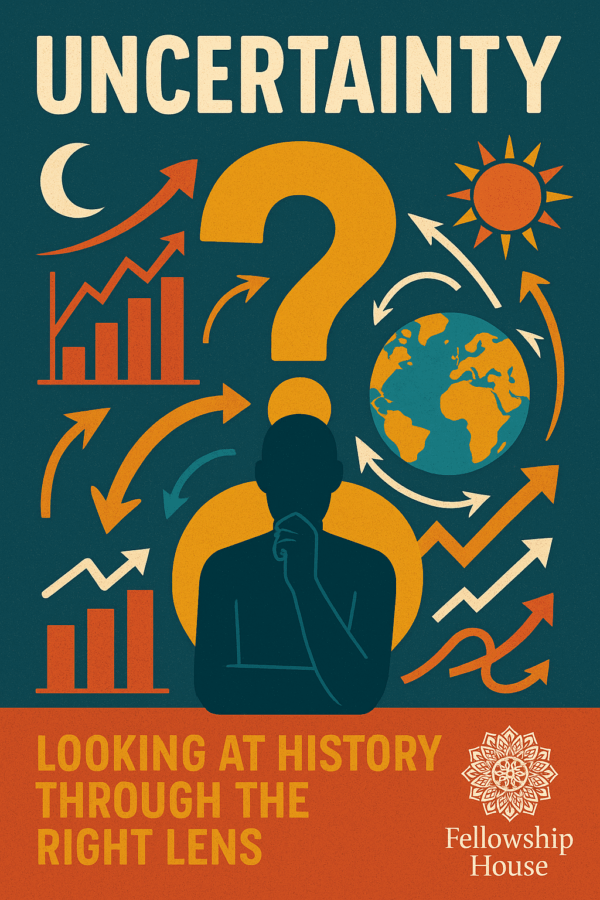When you’re sitting in early recovery, grappling with who you were, who you are, and who you might become, the future can feel suffocating. The uncertainty of it—where you’ll live, whether your family will speak to you again, if you’ll ever hold down a job—feels paralyzing. But what is uncertainty, really?
Uncertainty is strange. It’s the idea that we can perceive the future, but the future is not an objective thing—it’s a temporal event that hasn’t happened yet. It only exists as speculation, as probability. Real objectivity—the kind that creates cohesion, cooperation, and peace—can only come through shared understanding. It’s not solitary; it’s relational. The only way to throw a dart at the board we call the future is together.
And it’s the same way we examine the past—a past that’s incomplete, scattered, and experienced through layers of trauma, perception, and memory. Objectivity, again, means working together to find consensus, to reconstruct what really happened and how we got here.
This is also what happens in recovery. When we unpack our personal histories—often through the Fourth and Fifth Steps—we begin to distinguish what was real from what was imagined. As we refine that clarity in our own stories, we expand that skill outward. We begin to see the shared human story. Our ego—the persona we armored ourselves with—gets quiet enough to notice the larger pattern: we’re part of something.
And here’s one of the patterns that becomes clear: Violence is decreasing. Cooperation is increasing.
Steven Pinker writes in The Better Angels of Our Nature, “The decline of violence may be the most significant and least appreciated development in the history of our species.” His point isn’t that peace is guaranteed, but that measurable human progress exists—and it can be built upon.
Rutger Bregman echoes this in Humankind: “Most people, deep down, are pretty decent.” Our species has built civilizations, supply chains, and even space telescopes—not because we’re uniquely violent, but because we’re uniquely cooperative.
And yet—it doesn’t feel that way.
Why? Because your nervous system doesn’t track trends. It tracks threats. And threats are everywhere, especially in early recovery. When you’re drowning in debt, unemployed, alienated, unsure if Medicaid will come through, or if your supervisor is out to get you—your nervous system fires as if your life is in physical danger. But it’s often a social threat. Still, your body doesn’t know the difference.
In recovery, we teach a way out. At Fellowship House, that means cultivating a daily ritual of meditation—a practice that teaches awareness. You learn to observe your nervous system, your thoughts, your panic. You learn that they are real, but they are not necessarily true. You begin to gain agency over a system that has been running without your permission.
That’s the exit.
That’s the moment where uncertainty becomes possibility.
Where the chaos becomes a mission.
Where fear becomes a plan.
This ability to plan, to set goals, to move forward in recovery is not small. It is the reclaiming of agency. And it echoes what we’ve seen in history.
Yuval Noah Harari reminds us in Sapiens: “History began when humans invented gods, and will end when humans become gods.” Whether you believe that literally or metaphorically, we’ve reached a point where our collective actions—our cooperation, our tech, our medicine—can shape the world in godlike ways. But we must remain human to do it well.
David McCullough, in 1776, puts it more soberly: “History is who we are and why we are the way we are.” In recovery, we remember who we are—not just as addicts or alcoholics, but as human beings capable of evolution, redemption, and service.
Even Howard Zinn, in his People’s History of the United States, says: “If history is to be creative… it should illuminate the possibilities of ordinary people to be heroic.” And that’s exactly what recovery does.
Recovery doesn’t just give us back our lives—it gives us the tools to build a better world.
We can begin to see that the world—despite its many flaws—has been on a long arc of progress:
• Human life expectancy has doubled since 1750.
• Infant mortality has plummeted globally.
• The global poverty rate has fallen dramatically.
• Literacy and access to education are at all-time highs.
• Global supply chains bring food, medicine, and goods to remote corners of the world.
• Access to justice, civic rights, and due process—though uneven—is more widely accepted than at any point in history.
• Even in war, precision and global cooperation have reduced the scale of destruction compared to just 100 years ago.
These developments are not evenly distributed. Nor are they guaranteed. Progress is a trend—not a law.
Some critics of Pinker argue he overstates inevitability. But that misses the point. His real argument is one of perspective. As recovery teaches us, context matters. Knowing that the past has always been worse helps us see today with clearer eyes—and helps us take part in shaping tomorrow.
In a time of wealth inequality, AI disruption, and political tension, it’s easy to lose faith. But recovery offers us something deeper than optimism: it gives us agency. A daily practice of awareness, service, and community. A mission, even.
The past has always been worse. The stakes have changed. But the trend is still yours to fight for.
And that is a story worth stepping into.
